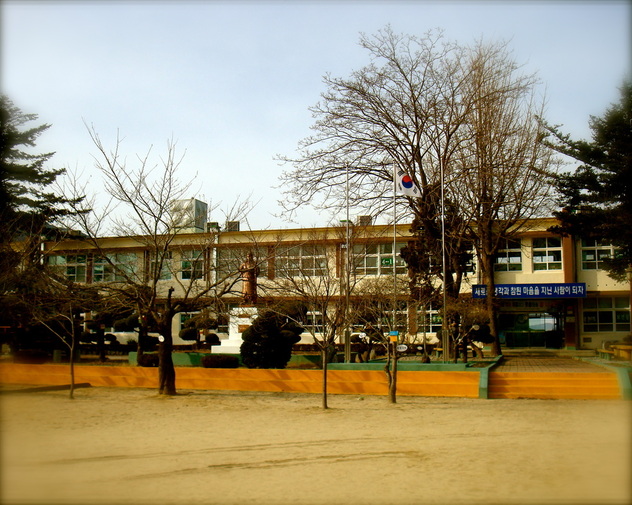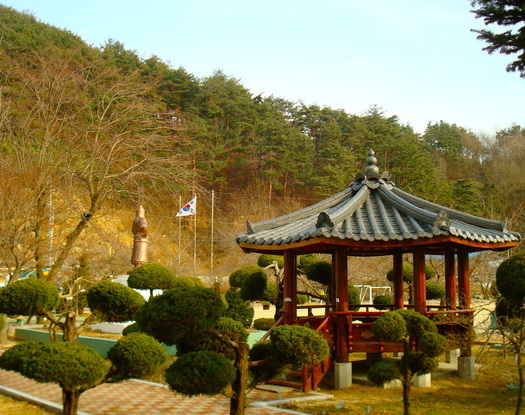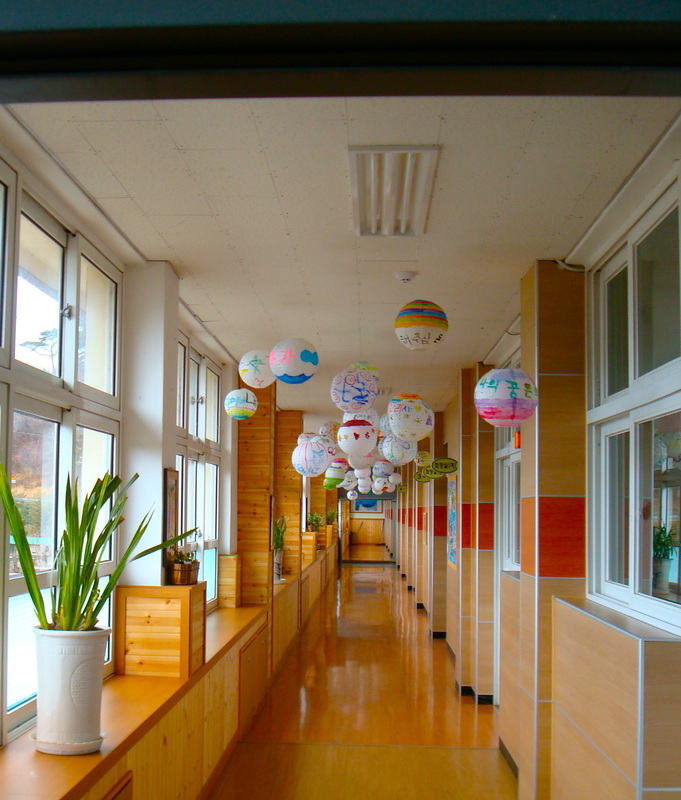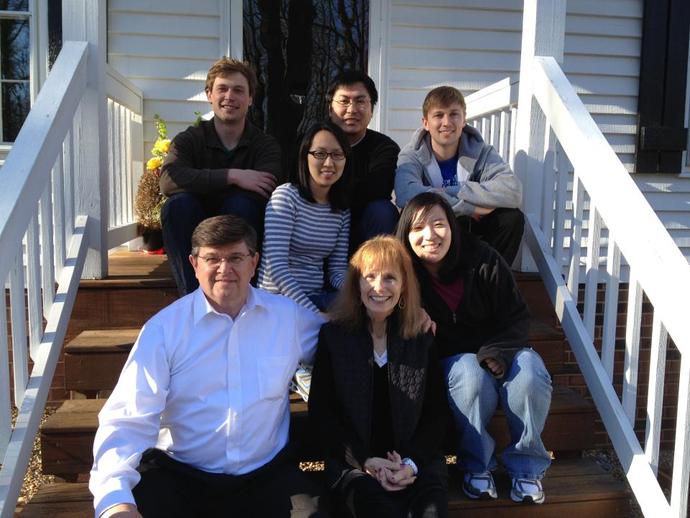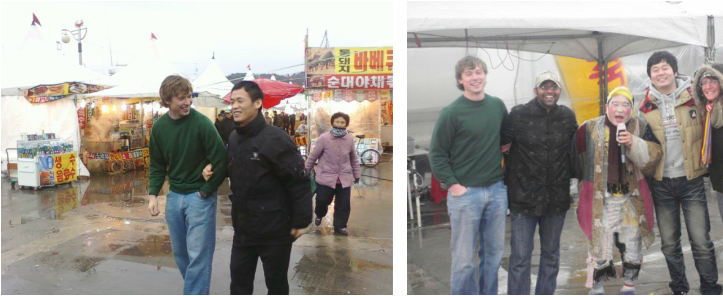This is my strategy for going to school. I run around and scream until an ajumma or "hal-mo-nee" (grandmother) literally pushes me onto a seat. Everyone at the bus stop thinks I am disabled. They might be right.
The "disabled foreigner" reputation is further reinforced by my bus of choice. The only reliable one i've found seems to be for the elderly or handicapped. There are less seats, but more handles and bars for increased stability. I think the driver has made an exception and lets me ride out of pity. I usually wait until we get close to my school then start screaming again until the same women force me off the bus.
None of the city buses have my destination on the window and in rural Korea it's unlikely to find English or an English speaker. The situation is further complicated by a lack of defrosters, meaning I can't even use the windows to gauge location unless I fight through ajummas to the front of the bus.
When I finally arrive, usually in a state of distress, I'll take my shoes off and put on sandals that are at best 4 sizes too small. From here I hunt down the principal and vice principal to give the obligatory greetings and bows, a process that's reversed at day's end.
You can't win, because if you let them pick their own names you'll end up with 2-3 "Optimus Prime's" and a "Korean Human". I've noticed a weird obsession with Optimus over here. Actually it's not weird, he is awesome.
This, is my teaching life.
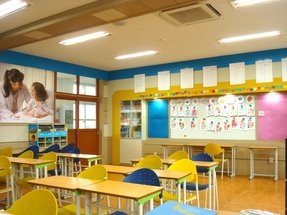 English room from the Teacher Cam
English room from the Teacher Cam All of the teachers are wonderful and do their best to make me feel welcome despite a significant language barrier. The students are also well behaved for the most part, likely a product of humble roots in rural Korea. It's a stark contrast to the urban kids I'd been working with before coming here.
The stares, whispers, questions, and nick-names my students bombard me with are further evidence some could count the number of foreigners they've ever seen on one hand.
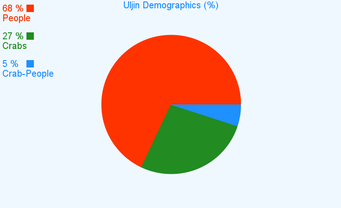 Breakdown of Uljin Citizens
Breakdown of Uljin Citizens I'm talking about visually stimulating students instead of smothering them with text. For example, this chart to the left was created based on extensive research I've been conducting since arriving in Uljin. If you don't know what a crab-person is talk to Andrew Jacob Senkowski. In High School he used to shape his hands like claws and creepily grab pretty girls' hair.
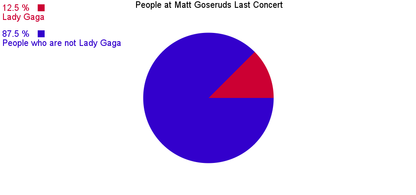 True Story
True Story My severe ADD enables me to relate to the attention spans of young children. I basically figure out what would be interesting to me, then usually get distracted and start staring at a wall.
After a squirrel distracts me from the wall, I get back to creating lesson plans. Another crazy thing about ADD is that do you guys want to go to the basketball game?
Staggering short and simple lessons with fun activities seems to work best. Fortunately these kids are smart, many already know so many Englishes. The most difficult thing I've encountered is the lack of curriculum, which on paper would seem like a good thing. It does allow for a bit of freedom when lesson planning, but creates more work while forcing me to guess ability levels and arbitrarily choose class topics.
There is a steep learning curve to becoming a good teacher and I have a lot to learn. I try to make small improvements on a daily basis and hopefully at some point the kids will get something from my ramblings. I'm lucky to know some great teachers whom I can lean on for insight down the road.
The work ethic of an average Korean student is remarkable. These kids cope with intense class all day before filling their evenings with private instruction, sports, and instrument lessons. They're lucky to get home late at night; cramming dinner, homework, and studying into their last hours. Their last hours of the day, not their last hours ever. You're sick. Most students repeat this process Groundhog's day style for years, some even using weekends as opportunities to study more.
This type of lifestyle can make students maximize their potential, yes. It can also drive them to exhaustion. I want my students to work hard and hopefully learn, like any teacher. But I also want them to leave English class with a positive association of the language. I think the latter is more achievable, so my current strategy is to keep class as light and fun as possible with serious lessons sprinkled in here and there.
Being in the unique position of simultaneously learning and teaching a language, I can interrelate these experiences to hopefully improve as both teacher and student. I'm sure my philosophy and teaching style will evolve with time but I've thoroughly enjoyed the challenges up to this point. I mean it's not that hard to hang out with cute kids all day. It makes me miss my nieces a lot, and my nephew......a little. Sorry Jackson, but it doesn't matter you are 2 and you can't even read this.
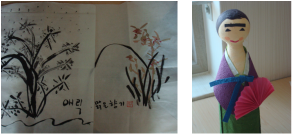 Korean style paintings / unibrow doll for Todd
Korean style paintings / unibrow doll for Todd It might seem counter-intuitive to think such simplicity could actually be better but I've found living with fewer possessions quite liberating.
I have boxes upon boxes of things at home that occupy my mind, but here I am 5 minutes away from packing a
backpack and having my entire life with me. Sorry for getting all Ricky WIlliams on ya but it's true.
Life in Uljin is improving as well with each new person I meet. It's more the people than the place, and the interesting individuals encountered daily make me forget about locational shortcomings. Not to say I don't miss my family and friends back home, but developing a network has been essential for adjustment.
Among these people are a few teachers that have cumulatively been in Korea for almost a decade. They thoughtfully invited me over for dinner and a night out my first weekend in Uljin, a rather comforting escape. At one point Mark, an Atlanta native, let me drive his car in Uljin. People here can't drive and laws are seldom enforced. An example is the highway patrol system. There are generally no police officers, only sensors along the side of the road to gauge your speed. The catch is that almost every Korean owns a GPS and almost every GPS can detect the sensors. This means with the right equipment you can drive however you please and never get caught.
But the reason most Koreans have a GPS isn't necessarily to avoid speeding tickets, it's because many legitimately don't know or care where they are going. Like Kevin Goserud they depend on technology to replace a sense of direction. And like me, they have trouble walking in a straight line. I think this means most Koreans are actually Goseruds. Hold on, so does that mean most Goseruds are Korean? I'm not sure.
All of this talk about driving made me scared to venture to the crab festival with "Bobbie", a Korean guy who works at the Nuclear power plant in town. Oh yeah, there is a nuclear power plant in town. They call it a power farm and it helps subsidize many expenses for Uljin residents, so its not a completely bad thing. They also claim rain in Uljin makes you lose your hair so it might not be a good thing either.
Bobbie and a few others saw me working on a lesson plan and invited me to join them for the evening at the Uljin Crab Festival, about a 40 km and 30 minute drive away. Bobbie is a good driver.
We didn't actually eat any crab, but instead strolled through the different tents of street vendors finding a rare performance at the end of the strip. This consisted of one middle aged man in full make up singing requests to anyone who paid enough attention to listen. During a particularly upbeat song, another man, reeking of soju, grabbed my arm and began to hip check / thrust me. I didn't know what to do except thrust back, so we went at it for about two verses. When he reached for my hand I decided it was time leave. For a hotel. Personal space can be an issue here.
A few more stories come to mind, but they'll just have to wait. You see, April is around the corner and I have to plan my lesson about Chernobyl Victim Remembrance Day.
I also apologize for any typos occurring during this post. I frequently wear gloves when writing to combat a broken heating system and historically cold Korean winter.
Note: All pictures should be expandable, except for the one of Tgos dominating cake / scaring children. No one wants to see that.

